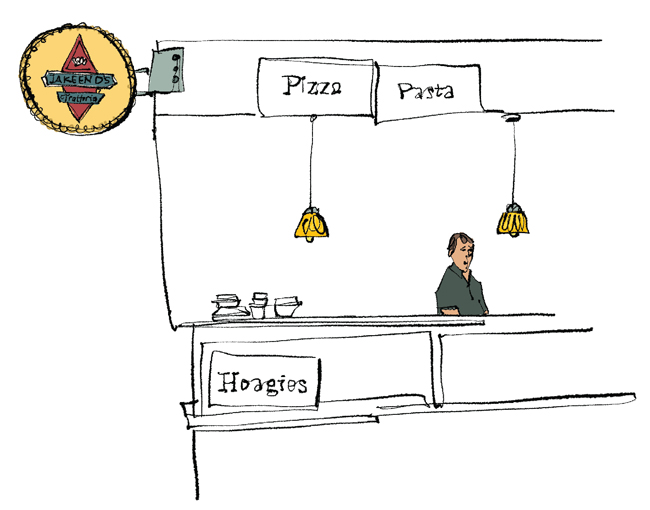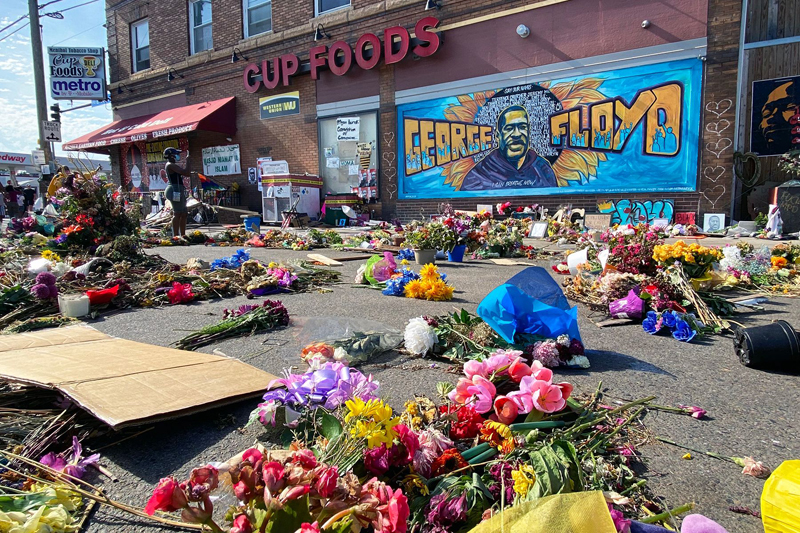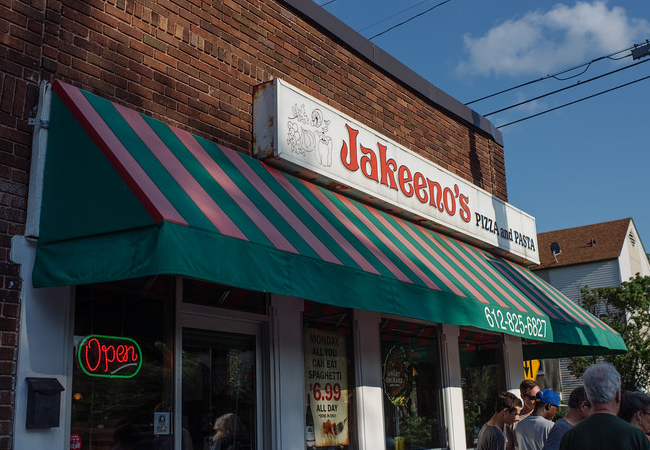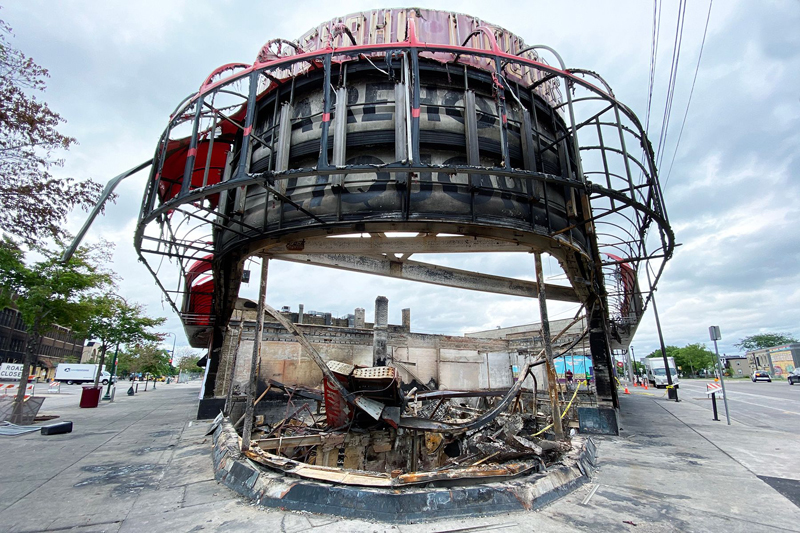TOP ILLUSTRATION BY ALLEGRA LOCKSTADT; JAKEENO’S ILLUSTRATION BY WACSO; JAKEENO’S PHOTO BY BECCA DILLEY; GEORGE FLOYD SQUARE AND MINNEHAHA LIQUORS PHOTOS BY BRENDA JOHNSON
Most weekdays, I walk my dog past Mama Sheila’s on 38th Street and Bloomington Avenue, daydreaming of collards and yams. Every Saturday, I pass Jakeeno’s and Pie & Mighty, which share the same building at 36th and Chicago. On good days, I’ll ride my bike over to 38th and Chicago – the same intersection where George Floyd was killed by Derek Chauvin, a Minneapolis police officer, in May 2020 – and grab take-out from Smoke in the Pit or Dragon Wok. Nearby, there’s also Matt’s, Reverie, Modern Times Cafe, and more. I’ve long been aware of the abundance of restaurants near my South Minneapolis home. But ever since the pandemic and the uprising last year, my heart seizes when I pass each one. I wonder, are they going to be ok? Is enough money coming in? What help might they need?
Meanwhile, the intersection of 38th and Chicago looms large in Minneapolis’s collective imagination. Since June 2020, it has been known as George Floyd Square: a volunteer-occupied place for mourners to pay their respects to Floyd. Barricades block traffic from entering, and a raised fist sculpture rises from the intersection, surrounded by flowers, art, and other offerings. Some residents want the intersection to stay closed, and some do not. The City of Minneapolis has announced plans to reopen the intersection to traffic following Chauvin’s March trial.
It’s been a long year for people and restaurants across the country, but especially those in South Minneapolis. I decided to ask nearby restaurant owners if they’d meet to discuss the ups and downs of 2020. On Feb. 8, I spoke with Frederick Braithwaite of Mama Sheila’s, Amy Keegan of Jakeeno’s, and Rachel Swan of Pie & Mighty, all of whom are situated within a mile of George Floyd Square.
This transcript of a Zoom roundtable discussion on Feb. 8, 2021 was edited for length.
FREDERICK BRAITHWAITE: I am Frederick Braithwaite, and I own Mama Sheila’s with my lovely wife, Sheila. My wife originates from Chicago, and I was born in the Caribbean and migrated to this great country like 30 years ago. My wife loves to cook, and she has cooked for churches and weddings, big groups, and so forth. One day in 2006, one of my friends asked me if we wouldn’t like to have a deli. I said sure, why not? I’ve got great skills in building construction; I am a licensed contractor. So we opened up a deli on Portland and 38th [inside] the Portland Market. People enjoyed the food so much they encouraged us to get a restaurant.
And about three years ago, we found this place on 38th and Bloomington, and I built it out myself. In the build-out, I tried to accentuate African-American culture. We have soul music playing all the time, we have pictures of soul artists and a little African-American history across all the booths. We have a huge portrait of Prince himself in there. We have all kinds of cultures coming to the restaurant, and they really do enjoy it.
AMY KEEGAN: Frederick, it’s super nice to meet you, because I’ve driven by your place a lot and been super curious about it, and I unfortunately haven’t stopped in, but I will at some point, for sure. My name is Amy Keegan. I’m one of the co-owners of Jakeeno’s Pizza & Pasta on 36th and Chicago. My sister [Patty] and I took it over from my parents in the early 2000s and did a major remodel. Then, in 2006, we opened a second location in the Midtown Global Market on Chicago and Lake with a business partner.
 Last December, we decided it was the end of our time in the Midtown Global Market, so we closed down that business. But our original location on 36th and Chicago is going strong. And we’ve been around since 1975 – that’s when my parents started it.
Last December, we decided it was the end of our time in the Midtown Global Market, so we closed down that business. But our original location on 36th and Chicago is going strong. And we’ve been around since 1975 – that’s when my parents started it.
RACHEL SWAN: I’m Rachel. I am the proprietor of a business called Pie & Mighty. It’s owned by my spouse [Ratchet] and I. My spouse works full-time in a job that is not at all related to food, and I’m the primary person who does the day-to-day restaurant type of work. I have been in the food industry for much of my adult life. But I’ve never been in the kitchen. So I call myself a piemaker now, and that is a very different role for me.
I’ve been in and around this neighborhood for quite a long time. We operated in a church basement [in the Corcoran neighborhood] before we built out our space. And we’re actually in the same building as Jakeeno’s on 36th and Chicago.
CECILIA JOHNSON: Thank you. Why did you all – or in Amy’s case, your family – open your restaurants in South Minneapolis?
BRAITHWAITE: We thought it was a good location being at a corner of two main streets, the intersection of Bloomington – the [14] bus travels along Bloomington – and also 38th – the [23] bus travels along 38th. It might not be the greatest of spots, but it’s the best we could have found at the point in time.
SWAN: We happened to find the space next to Jakeeno’s because Patty – Amy’s sister and the other owner – went to high school with my spouse and became a regular customer when we were in the church basement. I used to drive all over the city, and I would look in every window and every door – every place that looked like it might be available. What ultimately brought us to where we are was our relationship with Patty. Jakeeno’s has been in the business for so long, and we really wanted to put ourselves in connection with somebody who is anchored in the neighborhood. Someone who was part of what I like to call “the B-squad.” Meaning, I’m going to “B” here when you get here, and I’m going to “B” here when you leave.
Of course, we opened on March 14 of last year. So two days later, the COVID shutdowns and all that stuff was happening. And then the rest of 2020 – basically, the world was two blocks away. So nothing has been as we thought it might be, but overall, it’s been pretty amazing.
KEEGAN: Originally, the Jakeeno’s space was called Pizza Papa’s. And it was owned by the Curran restaurant family. At the time, my dad was working for Big B’s Pizza, and he was really tired of working super hard for other people and wanted to try it on his own. So he came across the space. … That corner is where I grew up. I never went to daycare; I learned to write my name there. Our family has so many incredibly important connections to that corner.
The people in this neighborhood are the only reason we are still there. We’re on second- and third-generation [customers] in certain families. I can’t say enough about the community and how supportive they’ve been of us throughout the years. And it’s been through a lot, right? I remember when crack cocaine was first introduced to our community, and Powderhorn Park was just a wreck. It was a scary time when that happened, and we just kind of coasted our way through all those ups and downs.
JOHNSON: Rachel, it felt very memorable to me that Pie & Mighty opened on Pi Day on March 14, 2020. I remember reading the Star Tribune article that featured y’all that week, and it was like, “Oh, you know, hopefully the pandemic will all be over soon,” but no. Thinking about mid-March last year, I almost have to laugh and cry. I assume that you and your spouse must have had intense conversations that week. Where were your heads at?
SWAN: You know, I don’t even know that we really had our wits about us. The amount of time we had between getting our license to operate and actually operating was less than 24 hours. We have that sort of typical restaurant story, where you’re opening and learning things on the fly.
[Ratchet and I] were very naive about the state of the world at the time. We were so knee-deep in building out our space that I didn’t know that a pandemic was coming. And I am a person who – when people need a hug, I hug them. When people need to be seen, I see them. And so, watching the line of people that went down the block on that first day, it was like, do we hug? Do we not hug? Do we feel celebratory? Are we worried? What exactly should we be doing? And that pretty much sums up the whole of our operating experience so far.
JOHNSON: Hmm.
SWAN: This hasn’t happened to any of us before: being at the epicenter of an uprising at a time when there’s a pandemic going on. And I’ve never owned a business before. So we’re really building the plane while we’re flying it, and, oh my gosh, I don’t know that we would want to be anywhere else than this particular community.
I often think about the neighborhood itself and how much it’s changed. But if there was anywhere in the world that there was a community that was ready to do the work that we need to do, it really feels like Powderhorn might be that community. It’s a very involved neighborhood. People who have been there have been there for a very long time. People care deeply about what’s going on. We don’t know much, but boy, the community around us knows a lot. And we get a lot of wisdom from them.
KEEGAN: And they’re not afraid to share, right?
SWAN: No, they’re not afraid to share.
JOHNSON: Amy and Frederick, what was going on in your lives and your restaurants early last year?
 BRAITHWAITE: I have to say: That day, when all the drama started, you know, down at Chicago and 38th, my wife cried. I remember her weeping. I was extremely hurt and upset. And I remember coming to the restaurant that afternoon. I saw tons of people going west on 38th, towards Chicago. And I saw them holding signs. And I’m saying to myself, “Where are all these people going, I didn’t know that they were going to be having that march.” And most of them were white people. I’m looking at them, saying, “Hmm, that’s interesting.” And that’s not just interesting, but that kind of goes against what people want us to believe.
BRAITHWAITE: I have to say: That day, when all the drama started, you know, down at Chicago and 38th, my wife cried. I remember her weeping. I was extremely hurt and upset. And I remember coming to the restaurant that afternoon. I saw tons of people going west on 38th, towards Chicago. And I saw them holding signs. And I’m saying to myself, “Where are all these people going, I didn’t know that they were going to be having that march.” And most of them were white people. I’m looking at them, saying, “Hmm, that’s interesting.” And that’s not just interesting, but that kind of goes against what people want us to believe.
Lots of people want us to believe that there is this huge extent of hatred that’s permeating the community. But that day, when I looked at [the march], I said, I’m not sure that’s the real thing – that that’s actually accurate. I mean, in every society, you’re gonna have those crazy nuts and those people who are stupid or angry for whatever reason. But we can’t paint the whole society with that negative brush, you know? Because there were more – a lot, lot more – white people who were angry about what happened to George Floyd. And they weren’t angry in a way that they hid it. They showed it that day and days afterwards.
So I’m not one of those Black people who believes that white people hate me. Oh, no, I don’t believe that. There are those who would, and I don’t care about them. They have a problem, and they have to deal with it. But I believe in love, and I believe that we should share love. And if you come into our restaurant, we try to portray that. We don’t care what the color of your skin is; it’s not a factor. What is in your heart is the factor. So what happened back there on 38th and Chicago was sad. I mean, very sad. But it does not define us as a community. […]
And another thing I want to say is, that incident took place in the middle of something that was evolving: a pandemic. And have you noticed, we’re talking now! Why are we talking? If these things did not happen, I wonder if we would have been talking. You get my point? I think it has helped to, in some weird way, bring people together. And that’s a good thing.
JOHNSON: It’s funny that you say that. I’m a renter, and I’ve lived in my apartment for two years. Before the pandemic, I knew two of my neighbors. Now, I know, like, 20 of my neighbors. So I identify with that, and Frederick, I’m glad that you’re finding other people, or that this is an example of that.
KEEGAN: It comes back to why we’re doing what we’re doing, right? It’s about food and community. You know, one of my drivers was robbed not too long ago. We had an incident where people came in and assaulted my staff, and the police were ineffective and not helpful. And it’s crushing, because we’re just trying to bring you some food to feed your family and maybe give you a night off from having to cook. I take it very personally when things like that happen, because we’re all here for that reason, right? It’s to share that joy of food.
BRAITHWAITE: Amen.
 KEEGAN: We’ve been doing this for a really long time at Jakeeno’s. The day-to-day is usually very operational. You come in, you turn on the ovens at this time, and there’s these steps that you take each day. And between the pandemic and the murder of George Floyd, every day was different. I was making decisions, to not only try and protect my people, but also protect the community. It was a lot to bear, in trying to take on that responsibility and trying to keep business open.
KEEGAN: We’ve been doing this for a really long time at Jakeeno’s. The day-to-day is usually very operational. You come in, you turn on the ovens at this time, and there’s these steps that you take each day. And between the pandemic and the murder of George Floyd, every day was different. I was making decisions, to not only try and protect my people, but also protect the community. It was a lot to bear, in trying to take on that responsibility and trying to keep business open.
BRAITHWAITE: As a matter of fact, [Sheila and I] live pretty close to where the fires were on Lake Street – like, about a block away from the police station that got burned down on Lake Street and from the Target and the Cub Foods. We went out there at night and saw the police were around the station, guarding the station. And then the next day, we went back; a bunch of the station was vandalized and burned. But now, Amy, you had an incident in your store. You called the cops, and they were ineffective.
I mean, the mantra that we have is – you know what the mantra is? Defund the cops. Okay, I agree 100% that there are evil cops. Yes, yes, yes. They need to be dealt with. They need to be punished. They need to be kicked out of the service or jails, whatever. But that doesn’t mean every cop is a bad cop. Amy, who should you call when you have a situation like that? Your uncle, your brother, your cousin, your neighbor?
KEEGAN: Well, what was interesting is, the night where they assaulted my staff, there was a female police officer that was on 35th and Chicago when the incident happened, but she couldn’t respond while the suspects were still on-site. And there was five of them. She couldn’t respond, because she did not have a partner with her. And so it was about 35-40 minutes before she came down, and that was once she had confirmation that the suspects had left. And the suspects went to 38th and Chicago.
And then in the interim, the violence interrupters came by, from the Agape group. They were three gentlemen that came in. They were super nice, and they wanted information. So he’s like, “Here’s my number. Call me if something else happens.” They showed up maybe a couple other nights throughout the next few weeks, and they would stop by and ask what time we closed. But it’s not a viable long-term solution, and it doesn’t help the fact that I’m not comfortable with keeping the front door [unlocked during business hours]. My priority has really just been trying to protect my people, and my customers, too. It’s hard.
BRAITHWAITE: Yeah, it is. It is a lot to bear. That is true. And I think we’re coming to what you might have called this meeting together for, Cecilia. The question might be, how can we maybe help each other? How can we ask for help? I think that we are grateful for whatever we might have gotten from the government. But I think that the government should not just say, “Okay, here, this is a bunch of money. Look, take this! And be blessed.” I think that they should spend more time asking us what we need and how we need it, and what are some of the ways they can help us better.
SWAN: I think it has been interesting to navigate the types of available resources. As a new business, I know it’s not easy to navigate the hoops of getting a space open, just in normal, everyday times. Adding on to that, when it comes to COVID funding and different PPP packages – according to [the government], we’re a brand-new business. We don’t have any history to show you how much money we’ve gained or lost. But just because we don’t fit the normal molds doesn’t mean that we’re not needing help.
BRAITHWAITE: Rachel, I sympathize with your situation. At that point in building a business, when you’ve just started it up, you’re the most vulnerable. You’re the most broke!
SWAN: [pained laugh] Yep.
KEEGAN: I just think back to when we were putting up the [plywood] boards [in June 2020]. We had some graffiti on our 36th Street side. And the city was burning, literally, as we’re doing this. I got the mail that day, and it was a letter from the city. And it was from their graffiti removal people. It was basically saying, “You have until Monday to remove this graffiti on the side of your building,” and it just hit me. Like, the disconnect between our city leaders and what it truly is like to try and operate a business.
BRAITHWAITE: [Before the pandemic, city workers] came to our restaurant to sue us because the garbage was outside of the garbage container. Don’t you guys have something to do? You know, instances like that make me angry. The thing is, each business satisfies a specific niche in the community. So I think our leaders are supposed to understand that. For example, one of the things I know that we do at Mama Sheila’s is: There are people who have come into our restaurant. And they tell us up front, I don’t have any money. And you know what we do?
SWAN: Feed them.
BRAITHWAITE: We show them to the food, not the door. “Go get yourself some food.” And we’ve even sent food to people who ask for food; we have taken tons of food to parks and fed the homeless. Because we feel that’s what we should do: help those who don’t have. God has kept us through this time.
One of the things that is an issue, though, is COVID has affected our “clientele,” if you want to put it that way. Our clientele doesn’t have the money that they had before COVID. That has caused the daily customer number to drop. Now that the money has dropped, however, the cost for food has not. In some cases, it has gone up. Our rent has not gone down. The wages – now they’re talking about pushing the wages up even higher.
Right now, the price that we’re charging for food, I think, is right about where it should be. And when your customers don’t have money, if you push the price of food higher, what are you doing to your business? You’re closing it down. So we have to balance it, and I wish our leaders understood business more, so that they could understand our situation.
 JOHNSON: This sounds so painful. So…what happens? My whole heart wants to know, how much longer can you handle this? What help do you need, or what help would you like – whether it’s from the government; maybe from your neighbors; maybe from each other; maybe from me?
JOHNSON: This sounds so painful. So…what happens? My whole heart wants to know, how much longer can you handle this? What help do you need, or what help would you like – whether it’s from the government; maybe from your neighbors; maybe from each other; maybe from me?
SWAN: For myself, and for Pie & Mighty? The thing that I want the most from my peers, from my neighborhood, and from my community and community leaders and government is: I want people to be kind. And I guess, I just want to be seen and heard. But often, people make a lot of assumptions about what it means to be a small business owner – that we must be just rolling in it, and that we have lavish, extravagant lives. And I’m not sure that any small business owner worth their salt would ever say that about themselves. For me, I want to just do what I love, and in return, not have people telling me what an awful job I’m doing, or telling me I need to do more. I want more kindness, and more listening, and more roundtables. More togetherness, like this. Because it’s good to not feel alone in what we’re doing.
KEEGAN: It is very isolating, though, right? That’s kind of the issue of being an entrepreneur. Um, there’s a couple things I kind of wanted to touch on, in terms of what I think would help. What’s going to make the greatest impact to the most amount of people with the shortest amount of logistics? I go back to sales tax. They’ve thrown around this whole sales tax forgiveness idea, where it’s like, oh, for the month of whatever, we’ll forgive the sales tax. But it’s never actually come to fruition. I mean, that would have an immediate impact on cash flow for businesses.
BRAITHWAITE: Oh, yes.
KEEGAN: The other thing has to do with property tax relief. We are fortunate enough to own the building in which we’re located, which wasn’t always the case. But it has been for some time now. And I just got my 2021 property taxes, and they went up $1,000. Of course, that’s not just the city, it’s the county, and all that kind of stuff. But that’s another thing that would add, literally, an immediate impact on cash flow for businesses.
JOHNSON: That seems very practical.
KEEGAN: You know, I’ve not felt a lot of recognition of the fact that it’s a struggle for us, being where we are. And so I appreciate you reaching out and understanding and empathizing with that. It goes a really long way to feel like there’s people that are willing to put these things together and listen to us. And I think that’s kind of been the theme we’ve had throughout this conversation today – we just really want to feel heard and, ideally, understood.
SWAN: Yup.
BRAITHWAITE: Well, one good thing for me when I’m hungry for pizza, I know where to go. Pie? I know where to go.
JOHNSON: Truly!
KEEGAN: Pizza and pie at the same time.
BRAITHWAITE: You guys need soul food? Come on by.
SWAN: Frederick, you have fed me and my staff more than one time in the last six months. And we are super grateful. Because I think when you’re experiencing what each one of us does, you can just taste the passion and the love that’s in there. So thank you for feeding us.
BRAITHWAITE: You’re so welcome. So welcome.
Almost everyone in South Minneapolis has an opinion about whether or not the city should reopen the intersection of 38th Street and Chicago Avenue to traffic. Asked for his thoughts via email, Frederick Braithwaite shared, “I think it should be opened. Maybe a monument should be erected in the center of the intersection, and traffic would [go] around it.” Given that George Floyd’s death came so soon after the pandemic, Braithwaite says, it’s difficult to assess how the intersection’s closure has affected Mama Sheila’s sales.
Asked about the impact of the closure of the square and its possible reopening, Rachel Swan replied: “We haven’t seen changes in business because of the closure. I hope that when it reopens it is with the full support of the community who lives there. We are a part of a strong, historic neighborhood. We look forward to learning from them.”
Amy Keegan added, via email: “It is really important to memorialize what happened to George Floyd, so I hope they find a meaningful & respectful way to do that. We need to keep moving forward.”
( π ) Pi is a new digital currency developed by Stanford PhDs, with over 15 million members worldwide. To claim your Pi, follow this link https://minepi.com/yildiztekin Download from your mobile phone and use username (yildiztekin) as your invitation code. Then mine from your mobile or desktop to collect Pi coin everyday.



